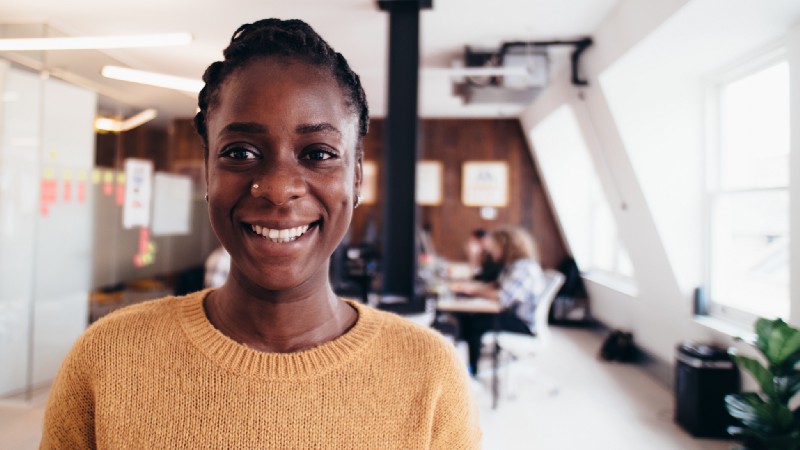by Rebecca Radding
Connecting the Dots —a Story of Learning to Code and Giving Back
Fatimat Gbajabiamila talks about challenging stereotypes, her love for pair programming, and why she’s committed to giving back
I sat down with Fatimat Gbajabiamila at the end of her first week at 27Partners, a software development and consultancy in London. Though the average Founders and Coders applicant is in their late twenties, Fatimat, who was born in Nigeria and came to the UK as a child, completed the peer-led training programme in full-stack JavaScript when she was just 22.
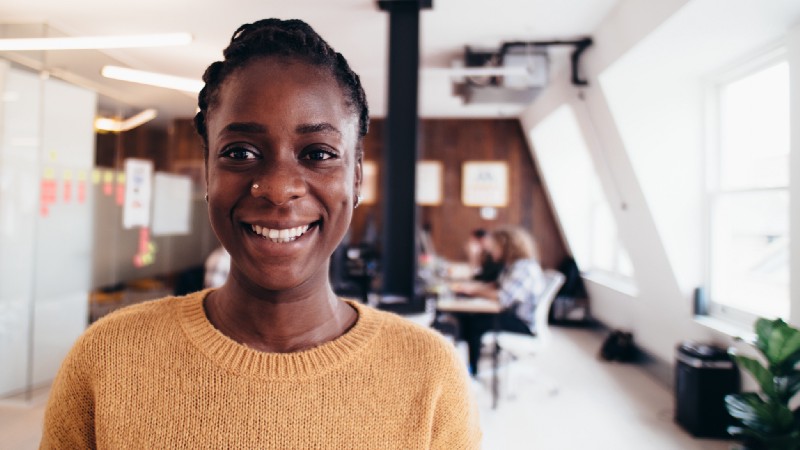
Rebecca: Fatimat, thank you so much for making time to chat with me. How was your first week on the job?
Fatimat: To be honest, it’s hard to believe I’m getting paid to code. It’s been quite the journey.
Rebecca: A journey you’ve undertaken without a university degree, as I understand.
Fatimat: Yeah, I left school after finishing my A levels, where I studied economics, business, and maths.
Rebecca: What were you doing before you heard about Founders and Coders?
Fatimat: I was working with a charity called Futureversity as a project coordinator, organizing summer programmes for young people and recruiting volunteers. I loved my colleagues, but I knew it wasn’t something I wanted to do as a career.
Rebecca: How did you figure out you wanted to pursue a career as a software developer?
Fatimat: Well, when I was younger, I had my heart set on pursuing a career in business and finance. I remember visiting Bloomberg on a trip as part of the Brokerage Citylink programme during Year 10 and deciding right then and there that I wanted to work there one day.
Rebecca: Really? Right then and there, as a teenager? It’s hard for me to imagine a fifteen-year-old falling in love with financial services.
Fatimat: Honestly, I think the host just did a fantastic job of selling the company to us and inspiring us to aim high. They took us into the newsroom, where the trading numbers lined the walls, and then to an office, which was full of gadgets. That visit probably influenced my decision to study maths and economics, as I wanted to learn accounting so I could work for them.
Anyway, you grow up, life happens, dreams change and one day like me you start to ask yourselves important questions like, “What am I going to do with my life?” I was 21 and had no idea what I wanted to do with my life after Futureversity.
Rebecca: So how’d you land on coding?
Fatimat: It was a process of trial and error. I tried a few online courses, including G-suite administration and Salesforce Trailhead, but found that none of these programmes challenged me in the way that I wanted. In that kind of work, there’s a lot of fixed ways of doing things, and doing well is about trying to follow those ways. There was little room for me to be creative, to think for myself.
I was doing this experimentation while working with young people, which got me thinking a lot about improving access to education in Nigeria, which is where I’m from and where I spent my early years. Nigeria has the highest rate of out-of-school children in the world. I wanted to learn how to build a platform that would allow kids who can’t physically get to school to follow the curriculum online and still be able to take their exams.
Rebecca: This population of children who aren’t in school, do they have access to computers? To the internet?
Fatimat: Most of them wouldn’t, but I had a plan for sponsorship to address that. I never did build that application, because I got fixated on the idea of building something that could solve a big problem, like education for a very disadvantaged population, and got so caught up in exploring the options for building things, like Wordpress and other CMS, that before I knew it, I was obsessed with learning to code.
I wanted to hear from people in the industry so I did some googling and came across Codebar, a non-profit initiative that facilitates the growth of a diverse tech community by running regular programming workshops. I attended a session and realised, hey, I could make a career out of this.
At this point I hit a roadblock, because I didn’t have a laptop, so I couldn’t teach myself coding at home. I got lucky, though, because Mohammed (a colleague at Futureversity) found me a Windows laptop.
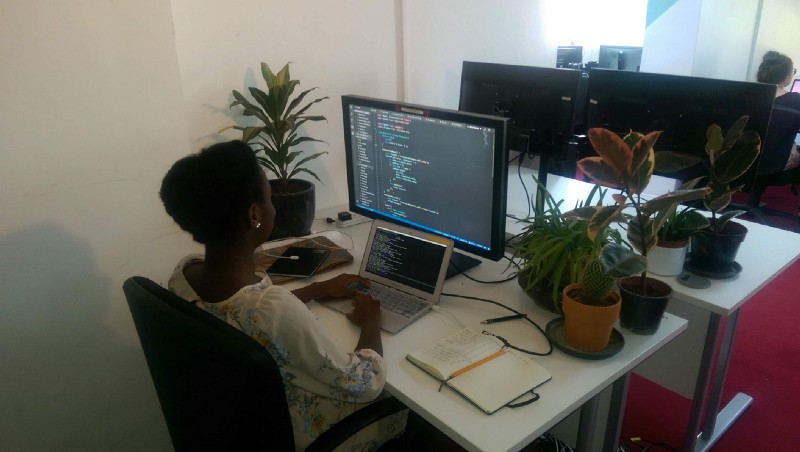
Rebecca: Tell me about your introduction to coding.
Fatimat: Once I got a laptop, I started going to Codebar every week. In one of the first sessions I attended, I was paired with a developer called Ben Scott, and his mentoring style really clicked with me. We were working on CSS, and when I got confused about the box model, he drew things out using pen and paper, which cleared things up for me right away. I actually asked Codebar to pair me up with him every time, as I found it so much more productive to stick with the same mentor instead of introducing myself to someone new every time. I learnt a lot of the fundamentals from him.
Rebecca: How did you hear about Founders and Coders?
Fatimat: After a few months of teaching myself to code in my very limited free time, I decided I needed to go all-in. But I had no money, so a paid bootcamp was not really an option for me.
I found out about Founders and Coders from an alumni at Codebar. She had me at “it’s free and it’s collaborative.” I went to the website, which explained the application process, and decided that before I went down that road, I should make sure it was really the right fit for me.
So I called the number on the website and, to my surprise, Dan (founder and executive director of Founders and Coders) picked up. He was really encouraging and spoke to me in depth about the application process and the course. I remember thinking to myself, “how can he be so nice when he doesn’t even know me?” After that phone call all my doubts went away and I threw myself into the application process.
Rebecca: Tell me about your experience on the course.
Fatimat: From the course content, to the teaching and learning methods, to the environment and the people…just, everything. Founders and Coders was such a great experience for me. For the first time in my life, I had no problem waking up early, even though I was often up late working, because I looked forward to every day on the course.
Rebecca: Any specific highlights?
Fatimat: Honestly, it was just good to be in an environment where I was challenged everyday and didn’t feel pressured to be less myself.
Rebecca: How do you mean?
Fatimat: People often have misconceptions or stereotypes of how you’re supposed to behave when you’re from a certain background. Chimamanda Ngozi Adichie’s TED talk The danger of a single story sums it up perfectly. For me, when I enter a new environment, especially a professional one, I behave as you’d expect any young professional to behave but someone usually questions whether I’m being genuine. Like they expect me to be the loudest one in the room or act outrageous in some way, because it’s the only story they’ve heard about black women. So it can often take longer for me to build relationships, which has at times hindered my progress.
Also, as I said earlier, I didn’t go university after A levels. Even though most of my cohort went to university, I never felt judged or less than them for having not gone to uni. What mattered was what we did on the course, and I always felt respected by my peers for what I brought to the table.
Rebecca: What do you think it is about the environment at Founders and Coders that lets you be yourself?
Fatimat: Well, on first day of the course at Founders and Coders, Dan gave a talk about what the programme and community are all about, and from the way everyone responded and the vibes in the room, I felt I could be myself. I think the idea that we’re all in it together, that it’s not a competition…it eased the pressure I usually feel and helped me focus with a clear head.
I didn’t feel self-conscious asking questions, because I knew that our mentors were people who had just been through the programme, and that they understood what it was like to be confused. Knowing our mentors had finished the course, and were working in the industry, helped me keep the faith that eventually I’d get there too.
On my laptop, I have a sticker with the quote,
“Trust that the dots will somehow connect,”
and almost every time someone paired with me they would joke,
“Have the dots connected yet?”
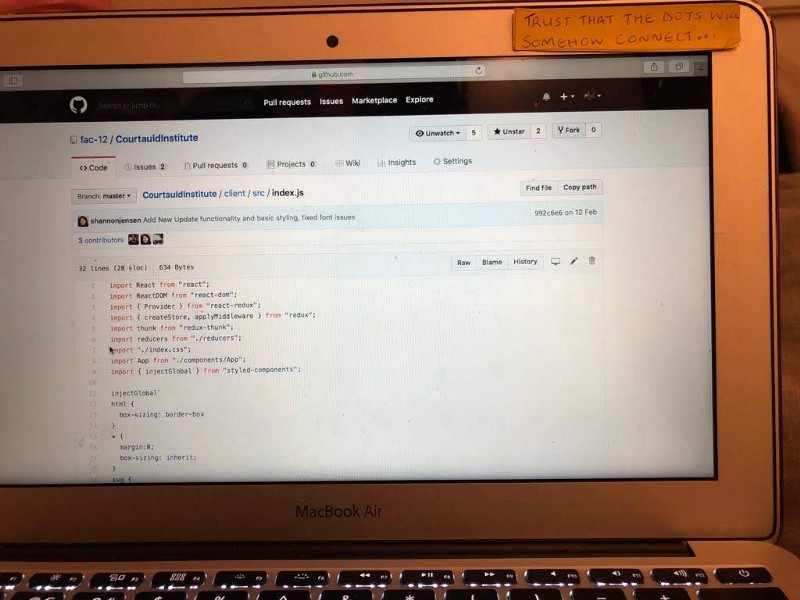
Rebecca: Tell me more about your experience with peer-led learning at Founders and Coders.
Fatimat: I had experience pair programming from Codebar, but at Founders and Coders it is mostly pairing from ten in the morning til six at night. That’s a lot of time to spend next to someone! After the first project, when we worked as a team of four to build a one-page website, I couldn’t imagine working in any other way though.
I guess you could say my experience at Founders and Coders spoiled me!
Rebecca: How so?
Fatimat: Well, when I interviewed for jobs, I was clear about not wanting to code alone all the time. I truly believe that in this field, two heads are better than one.
Also, at Founders and Coders, your cohort is like a family. It’s not one of those places that claim to be a family but their actions prove otherwise. We make decisions about the organisation together, we code together and best of all we party together. I am no longer worried about going to meetups/tech events alone because I know when I get there I will most likely meet an alumnus of Founders and Coders and even though they might not have been from my cohort, we will be buddies.
So when I started interviewing I knew I wanted to work somewhere that it really felt like a community.
Rebecca: During the second half of the course, you worked on two longer projects. I’d love to hear about the apps you built.
Fatimat: For the first project, we pitched app ideas to each other. My idea was for a web app called HomeSafe, which would allow parents to notify their child’s school if someone other than the regular guardian would be collecting the child, and three of my fellow students chose to work on it with me.
We got off to a slow start, because we spent a lot of time talking about how to spend the two weeks allocated to build all of the features we wanted. Finally, I was assertive with the team about starting with something small, and working from there, adding one feature at a time to the MVP. In the end we built a beautiful web app that had an impressive number of features for a two-week build.
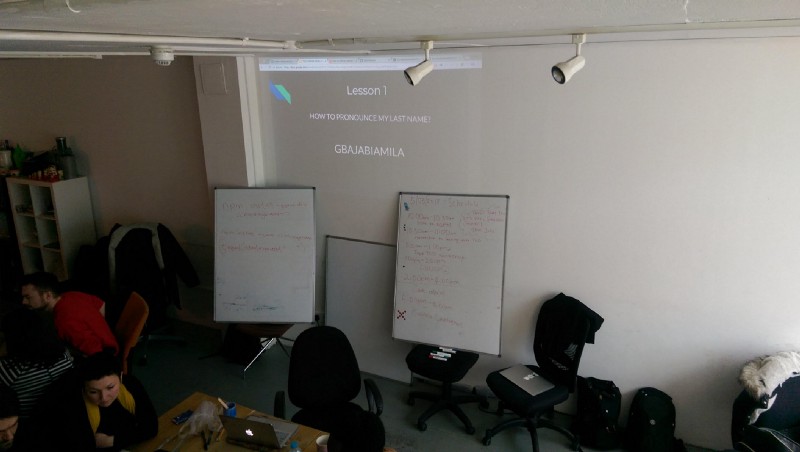
Rebecca: What about your client project? Tell me about who you worked with and the development process.
Fatimat: During the final month of the course we built an application for the Courtauld Institute of Art, the world’s leading centre for the study of history and conservation of art and architecture. They had been working with volunteers to catalogue and digitise a huge collection of photographs and art for their Courtauld Connects initiative, and at the time were preparing to more than triple the current number of volunteers in order to accelerate the multi-year project.
Initially they wanted us to help with the digitisation, but after we did a design day with them we realised that was too big of a project for us to accomplish in three weeks. Instead we decided to focus on improving the volunteer experience. We spoke with volunteers and learned they wanted to feel like a community as well as to get regular progress updates to see their impact on the organisation as a whole.
Rebecca: How did it turn out? Have the volunteers been using it?
Fatimat: In the end we built an app with a volunteer directory that enables volunteers to share interesting pictures with each other, and staff/volunteers to post regular updates on the project, and the app is still in use today.
Rebecca: When you finished the course, you spent a week mentoring the next cohort. I’d love to hear about your experience as a mentor. Did the dots finally connect?
Fatimat: I actually chose to mentor on week two, test driven development, which I originally found really difficult, because I wanted to spend more time with the material. I hoped that by explaining the content to the new students it might click for me. I was a bit intimidated, to be honest. Before mentoring the new cohort, I’d met a few of them and seen their personal websites, and it seemed to me like they knew more before starting the course than I did after completing it. I wasn’t really sure if I’d be able to teach them anything.
We pair up to mentor, and I found the whole process of preparing with a partner so valuable — in fact, by the time we had finished planning I was already feeling more capable and confident I’d have something useful to share with the new cohort. In the end I really enjoyed mentoring and to my relief, the dots finally did connect on the topic of testing for me!
Rebecca: You’re known around Founders and Coders for your sense of humour. Any particularly silly moments you’d like to share?
Fatimat: I was the DJ at our “End of Founders and Coders” party. I got good feedback; so who knows, if coding doesn’t work out, DJ Fatz might be another option. I should probably start taking lessons now.
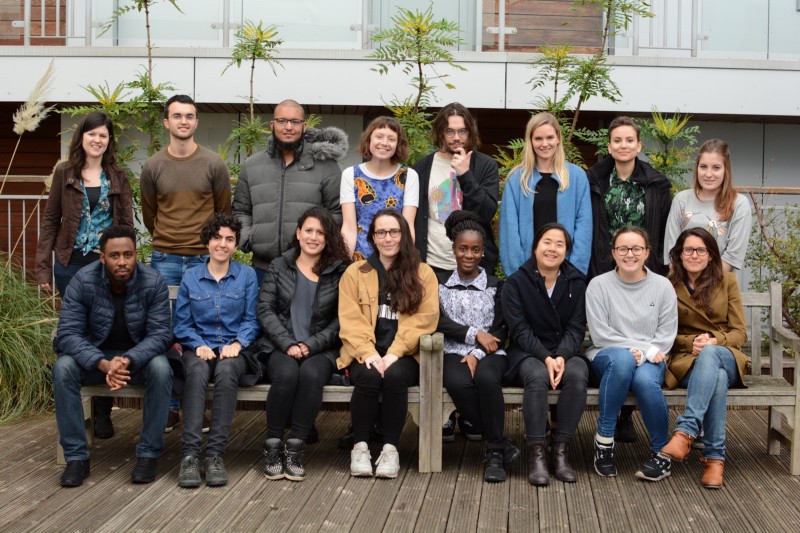
Rebecca: You joked earlier that Founders and Coders spoiled you for your interviews. Could you tell me more about your experience looking for work?
Fatimat: Joe, our commercial manager, was supportive during and after Founders and Coders. Everybody’s situation is different, which Joe recognises and takes it into account when advising us. After completing the bootcamp, I had some things I had to sort out so I could not look for work straight away, Joe would message me often just to see how I was doing and asked if he could be of help in any way. When I was ready to look for work, he listened to my concerns about working in the industry and paid attention to the kind of environment I wanted to work in, which helped him place me with my current employer, 27Partners. He also bought me food during our one-to-one chats so this might be the free food talking. I’m joking — Joe really is great at what he does.
Rebecca: What is your role at 27Partners? What kind of projects will you be working on?
Fatimat: It’s a junior JavaScript developer role. I will be working on the company’s client products and its own platform StoryShare. The company is looking to grow soon so it seems like an exciting time to be joining them and hopefully I can be a part of that for a while. So far, I’ve had the freedom to get on with contributing to their project with the option to ask for help if I need it. We’ve had conversations about how we can be more collaborative and I will be teaching the team some of the things I’ve learnt from Founders and Coders, including pair programming, of course!
Rebecca: Look towards the future for me. What are your goals?
Fatimat: For now, I’m just focused on getting through my first year as a professional developer! But I am definitely still keen on building the learning platform I told you about earlier.
I’m also a big believer in giving back. It would be selfish of me to go forward in life and not give back to the community who gave so much to me. Growing up, a lot of people worked with me, through charitable organisations and empowerment schemes. I did Prince’s Trust Team Programme, Uprising Leadership Programme, Career Ready, Allen & Overy Smart Start Experience, and FutureVersity summer courses. I am committed to helping others build themselves up, especially young people— starting with my siblings—and being a role model.
Learning to code, I got support from Codebar, Nodegirls, Rob from Thoughtbot through the Thoughtbot Mentoring Scheme, and Fabio from YLD through Recwork Meet a Mentor scheme and Peter Rhodes at Founders and Coders meetups.
So this summer, I ran two Introduction to Coding (HTML and CSS) workshops for teenagers. I did one at WAC Arts College, which was through Founders and Coders, and the other at Futureversity. I am definitely interested in running more workshops in future, as well as mentoring at Codebar and CodeYourFuture.
Rebecca: I’m inspired by your commitment to connecting the dots for the next generation!
Fatimat: What can I say, it’s just important to me that I do for others what many people have done for me, and y’know pay it forward.
Rebecca: Thanks again for the chat, Fatimat.
Fatimat: It’s cool. Thank you!
To learn more about the tuition-free training programme, visit www.foundersandcoders.com.
